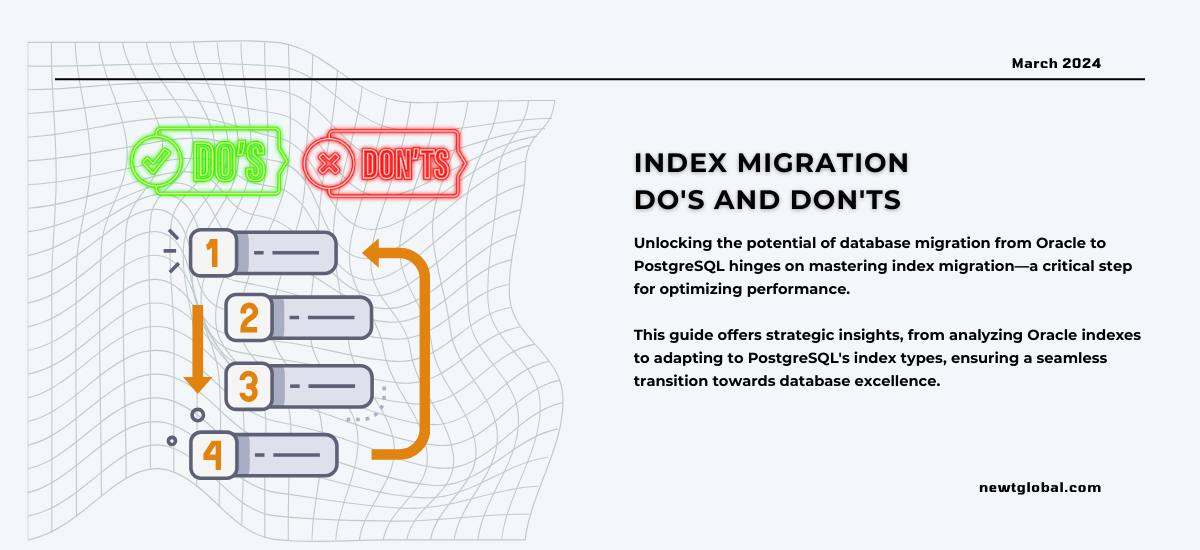
In the world of databases, moving from Oracle to PostgreSQL is like going on a big journey to make your operations and technology better. One important part of this journey is moving the indexes. This is not just about moving data; it’s about carefully organizing the index structures to work well in PostgreSQL, so you can access and change data quickly and efficiently. This guide talks about the key things you should and shouldn’t do to make sure your transition is smooth and improves your database performance.
Starting the Index Move
Moving indexes is a big deal. It involves looking closely at how indexes are set up in Oracle and figuring out how to set them up in PostgreSQL to make your searches faster, keep your data safe, and use PostgreSQL’s full capabilities to make your database work even better.
Tips for a Smooth Transition
When moving from Oracle to PostgreSQL, you have a chance to improve how your indexes work. Following these tips will help you avoid problems and make the most of what PostgreSQL can do.
Things to Do:
-
- Study Your Oracle Indexes: Before you start moving anything, study how your indexes work in Oracle. For example, if you have an index that combines two things like ‘last_name’ and ‘date_of_birth’, but in PostgreSQL, you mostly use ‘last_name’ alone, consider splitting the index into two. This can make things faster in PostgreSQL.
- Use Migration Tools: Tools like DMAP(Database Migration Acceleration Platform) can help automate the process of moving indexes. They can convert indexes accurately from Oracle to PostgreSQL. But remember to check the output to make sure everything is set up well for PostgreSQL.
- Try Different Index Types: PostgreSQL has many types of indexes for different types of data and queries. For example, if you used one type of index in Oracle for text search, in PostgreSQL, you might use a different type to make searches faster.
- Test Everything: After moving indexes, test your new setup a lot. Run the same tests on both databases to see if PostgreSQL is faster and if everything works as it should.
Things to Avoid:
-
- Blindly Moving Indexes: Don’t just move all your Oracle indexes to PostgreSQL without thinking. Some indexes might not be needed anymore or might work differently in PostgreSQL.
- Case Sensitivity Issues: Oracle and PostgreSQL handle capital letters differently. Make sure your indexes work the same way in both systems, especially if they involve text searches.
- Function-Based Indexes: If you used special functions for indexes in Oracle, you’ll need to recreate them in PostgreSQL to keep things running smoothly.
- Skipping Testing: Don’t forget to test everything thoroughly after moving indexes. This is crucial for making sure your new system performs well.
Conclusion
Moving from Oracle to PostgreSQL is a big change, but it’s also a chance to make your systems better. Follow these tips to make sure your indexes work well in PostgreSQL and your database runs smoothly.
To learn more about how to successfully migrate your Oracle databases to PostgreSQL and optimize your indexing strategy, visit our website at newtglobal.com. For personalized assistance and inquiries, reach out to us at marketing@newtglobalcorp.com.
Newt Global DMAP is a world-class product that enables mass migration of Oracle databases to cloud-native PostgreSQL faster, better, and more cost-effectively. Don’t miss out on the opportunity to revolutionize your database environment and enhance your operational excellence with Newt Global DMAP. Contact us today to get started!
